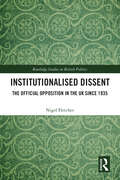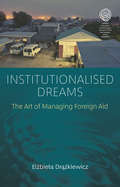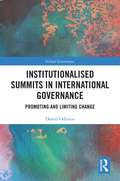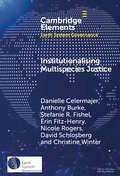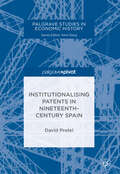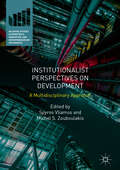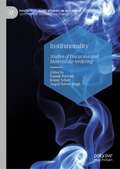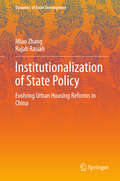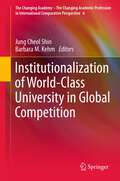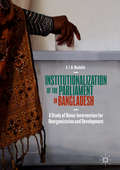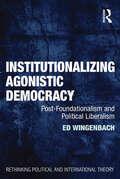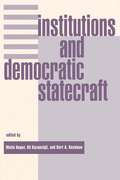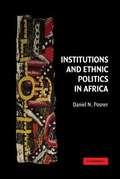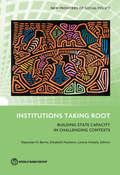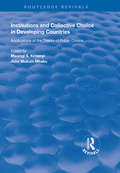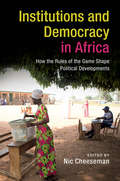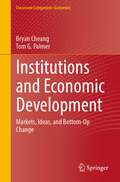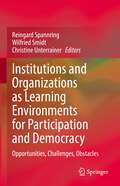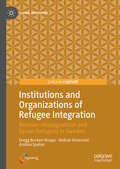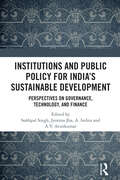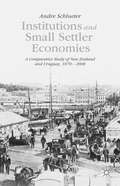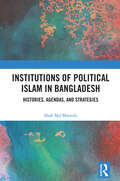- Table View
- List View
Institutionalised Dissent: The Official Opposition in the UK since 1935 (Routledge Studies In British Politics Ser.)
by Nigel FletcherThis book provides a comprehensive analysis of a peculiar but now firmly established British institution— the Official Opposition— tracking its development since 1935. Despite its inherent importance to the conduct of politics and government, the Official Opposition as an institution remains poorly understood. The concept of ‘Loyal Opposition’ has become so entrenched in the Westminster parliamentary model that it is now taken for granted that the principal challengers to the government of the day are given significant official recognition by the state. Political dissent has become institutionalised and legitimised. Using previously unpublished archive material and candid interviews with former Leaders of the Opposition and their staff, the book examines the constraints and dilemmas facing the Official Opposition. Detailing the way successive opposition leaders have organised their staff and Shadow Cabinets, it highlights the practical difficulties they face in holding the government to account and preparing for government. The study concludes by arguing that the role of the Official Opposition is vital but ill- defined, that the inadequacy of its resources has impacted on its effectiveness, and that there are potentially serious challenges to it as a model. The book will be of key interest to scholars of British politics, British history, parliamentary and legislative studies, and government and democracy more generally.
Institutionalised Dreams: The Art of Managing Foreign Aid (EASA Series #38)
by Elżbieta DrążkiewiczUsing examples from Poland, Elżbieta Drążkiewicz explores the question of why states become donors and individuals decide to share their wealth with others through foreign aid. She comes to the conclusion that the concept of foreign aid requires the establishment of a specific moral economy which links national ideologies and local cultures of charitable giving with broader ideas about the global political economy. It is through these processes that faith in foreign aid interventions as a solution to global issues is generated. The book also explores the relationship linking a state institution with its NGO partners, as well as international players such as the EU or OECD.
Institutionalised Summits in International Governance: Promoting and Limiting Change (Global Governance)
by Daniel OdiniusThis book analyses the role of institutionalised summits in international governance, adding a fresh perspective to the controversial debate over the value of institutionalised summits for international governance. It argues that the contribution of these summits to negotiating and implementing international agreements on policy change is ambivalent. Based on an innovative theoretical model the books proposes that states strategically select summits with their specific institutional design for advancing their policy preferences. Developing the route to the summit and the route from the summit as precise causal mechanisms, the author argues that these choices explain the ambivalence of summit involvement. With empirically rich case studies on the Group of 7 (G7) and the European Council, the book provides a rare systematic comparison of different summits. The empirical record shows strikingly similar patterns for the G7 and the European Council, but it also points to variation deserving further attention in the study of summits in different institutional environments. It will be of interest to researchers in International Relations, Global Governance, and European Politics, and those interested in global institutions and decision-making.
Institutionalising Multispecies Justice (Elements in Earth System Governance)
by Stefanie Fishel Danielle Celermajer Anthony Burke Erin Fitz-Henry Nicole Rogers David Schlosberg Christine WinterMultispecies Justice (MSJ) is a theory and practice seeking to correct the defects making dominant theories of justice incapable of responding to current and emerging planetary disruptions and extinctions. Multispecies Justice starts with the assumption that justice is not limited to humans but includes all Earth others, and the relationships that enable their functioning and flourishing. This Element describes and imagines a set of institutions, across all scales and in different spheres, that respect, revere, and care for the relationships that make life on Earth possible and allow all natural entities, humans included, to flourish. It draws attention to the prefigurative work happening within societies otherwise dominated by institutions characterised by Multispecies Injustice, demonstrating historical and ongoing practices of MSJ in different contexts. It then sketches speculative possibilities that expand on existing institutional reforms and are more fundamentally transformational. This title is also available as Open Access on Cambridge Core.
Institutionalising Patents in Nineteenth-Century Spain (Palgrave Studies in Economic History)
by David PretelThis book examines the development of the Spanish patent system in the years 1826 to 1902, providing a fundamental reassessment of its evolution in an international context. The Spanish case is particularly interesting because of this country’s location on the so-called European periphery and also because of the centrality of its colonial dimension. Pretel gauges the political regulation and organisation of the system, showing how it was established and how it evolved following international patterns of technological globalisation and the emergence of the ‘international patent system’ during the late nineteenth century. Crucially, he highlights the construction and evolution of the patent system in response to the needs of Spain's technologically dependent economy. The degree of industrial backwardness in mid-nineteenth-century Spain set the stage for the institutionalisation of its modern patent system. This institutionalisation process also entailed the introduction of a new technological culture, social infrastructure and narrative that supported intellectual property rights. This book is important reading to all those interested in the history of patents and their role in globalisation.
Institutionalist Perspectives on Development: A Multidisciplinary Approach (Palgrave Studies in Democracy, Innovation, and Entrepreneurship for Growth)
by Spyros Vliamos Michel S. ZouboulakisThis book depicts the role of both formal and informal institutions in achieving long-term economic efficiency and development. It is organized into three sections: the first section deals with the historical and political roots that make institutions favorable to development; the second section offers theoretical perceptions of immaterial institutions; the last section explores how the various official institutions – such as international organizations – interrelate with the process of development. As both the recent global financial crisis and the subsequent sovereign debt crisis within the Eurozone have shown, sustainable development is a combination of human, social and institutional factors that interact with each other and go beyond the strictly economic conditions of each country. With contributions from several countries in Europe as well as Iran, this volume offers readers an international and multidisciplinary perspective of the institutionalist determinants of growth in the long run.
Institutionality: Studies of Discursive and Material (Re-)ordering (Postdisciplinary Studies in Discourse)
by Yannik Porsché Ronny Scholz Jaspal Naveel SinghThis edited book brings together humanities and social sciences scholars from the various disciplines at the nexus of discourse studies and ethnography to reflect on questions of institutional practices and their political concerns. Institutional order plays an important role in structuring power relations in society. Yet, contrary to common understandings of structure, institutional orders are far from fixed or stable. They constantly change, and they are resisted and reimagined by social actors. The 20 studies collected in this edited volume develop the notion of institutionality as an overarching perspective to explore how institutional actors and institutional practices order and reorder power in societies across the globe. Thereby the chapters pay special attention to the fluidity, volatility, fragility, and ambiguity of order, and consequently to its claims to authority. Employing a broad range of discourse analytic and ethnographic methodologies, the studies show how institutions are discursively and materially constructed, defined, represented and how they are made relevant and become powerful – or how they are resisted, transformed or lose significance – in interaction. Readers will obtain nuanced insights into ways in which differently positioned social actors engage in struggles about how institutions can be imagined and enacted across several domains, such as workplace interactions, architecture, mass-media representations or organisational publicity. This book will be of interest to readers in Applied Linguistics, Discourse and Society, Critical Discourse Analysis, Political Theory and Communication Studies.
Institutionalization of State Policy
by Miao Zhang Rajah RasiahUsing fresh evidence and a novel methodological framework, this book sheds light on how institutions have driven economic reform in China's urban housing sector. The book systematically analyzes the developmental role of the state in China, with rich empirical evidence to show how decentralization has brought about significant participation by the different levels of government with the central, provincial and municipal governments focusing on initiation, intermediation and implementation roles respectively. Despite many Western analysts claiming that it is single complex superstructure, the institutionalization of governance structures in China following reforms has taken place through strong coordination between governments at different levels to meet targeted plans. Although China still has a long way to go to before it can be considered developed, this book elaborates on how the country offers a unique alternative for other states seeking to develop by striking a balance between capitalist and socialist instruments.
Institutionalization of World-Class University in Global Competition
by Barbara M. Kehm Jung Cheol ShinMoving the academic debate on from its current focus on development to a more nuanced sociological perspective, this fresh research is a collaboration between academics in South Korea and Germany that assesses the factors shaping world-class universities as institutional social systems as well as national cultural treasures. The work explores in detail how WCUs have moved to a central position in policy circles, and how these often ambitious government policies on WCUs have been interpreted and adopted by university administrators and individual professors. The authors provide a wealth of empirical data on universities, both world-class and aiming for WCU status, in a range of polities and continents. They compare strategies for developing WCUs in countries of the East and the West, both developing and developed. Nations featured in the statistical purview include nine countries (Germany, France, Japan, South Korea, China, Taiwan, Malaysia, Singapore and Hong Kong SAR). The volume goes further than merely taking a snapshot of the current situation, offering detailed and considered strategies and rationales for institutionalizing and developing WCUs, particularly in Asian countries where Confucian cultural influences accord education the highest priority.
Institutionalization of the Parliament in Bangladesh: A Study of Donor Intervention for Reorganization and Development
by A. T. ObaidullahThis book explores the institutionalization process with regard to the Parliament in Bangladesh, and seeks to identify the main constrains that hinder the Parliament from serving as the uppermost representative body for all segments of society.This book sheds valuable new light on key reform initiatives carried out by donor communities in collaboration with the Bangladesh Parliament between the years 1991 and 2015 by presenting an extensive selection of donor proposals to make the Parliament a more potent political institution. The book also focused on the barriers of strengthening oversight, fiscal oversight in particular, resourcing parliament and its secretariat, hindering gender equality and gender responsiveness, counteracting forces that are weakening rule of law, civil liberty of the citizens, constitutionalism and democratic consolidation in the country. The book presents a comparative picture of the pre- and post-reform Bangladesh Parliament, highlighting on the issue of how much the donor assistance can help promote institutionalization of the parliament and democratic consolidation of a developing country. The book will be of immense value to all scholars interested in democratic governance, administrative reforms, policy studies and the role of parliament as a watchdog ensuring accountability, transparency and national integrity.
Institutionalizing Agonistic Democracy: Post-Foundationalism and Political Liberalism (Rethinking Political and International Theory)
by Ed WingenbachThe first book length study of agonism as a mature account of democratic politics, Institutionalizing Agonistic Democracy provides a lucid overview of agonistic democratic theories and demonstrates the viability of this approach for institutional politics. Situating agonistic democracy within and against debates about radical democracy, foundationalism, liberal democracy, and pluralism, Institutionalizing Agonistic Democracy engages the texts of Mouffe, Connolly, Ranciere, Tully, Honig, Owen, and others to fully map the contours of agonistic democratic theories. Organizing this diverse literature into a coherent typology enables sophisticated analysis of the assumptions, distinctions, and aspirations of the often conflicting theoretical positions gathered within the constellation of agonistic democratic theory. Using this framework to explore the concrete institutional possibilities appropriate to agonistic democracy, Wingenbach argues that a modified version of Rawlsian political liberalism describes the institutional conditions most likely to sustain agonistic political practices. Once shorn of metaphysical commitments and detached from aspirations to consensus, political liberalism offers a contingent and historically viable framework within which agonistic contestation can occur. Such a reinterpretation of Rawls produces not the sublimation of agonism but a transformation of liberalism, so that it more adequately accommodates the deep pluralism of the post-foundational condition.
Institutionalizing East Asia: Mapping and Reconfiguring Regional Cooperation (Politics in Asia)
by Alice D. Ba Cheng-Chwee Kuik Sueo SudoInstitutional activities have remarkably transformed East Asia, a region once known for the absence of regionalism and regime-building efforts. Yet the dynamics of this Asian institutionalization have remained an understudied area of research. This book offers one of the first scholarly attempts to clarify what constitutes institutionalization in East Asia and to systematically trace the origins, discern the features, and analyze the prospects of ongoing institutionalization processes in the world’s most dynamic region. Institutionalizing East Asia comprises eight essays, grouped thematically into three sections. Part I considers East and Southeast Asia as focal points of inter-state exchanges and traces the institutionalization of inter-state cooperation first among the Southeast Asian states and then among those of the wider East Asia. Part II examines the institutionalization of regional collaboration in four domains: economy, security, natural disaster relief, and ethnic conflict management. Part III discusses the institutionalization dynamics at the sub-regional and inter-regional levels. The essays in this book offer a useful source of reference for scholars and researchers specializing in East Asia, regional architecture, and institution-building in international relations. They will also be of interest to postgraduate and research students interested in ASEAN, the drivers and limits of international cooperation, as well as the role of regional multilateralism in the Asia-Pacific region.
Institutionalizing Rights and Religion
by Leora Batnitzky Hanoch DaganModern statesmen and political theorists have long struggled to design institutions that will simultaneously respect individual freedom of religion, nurture religion's capacity to be a force for civic good and human rights, and tame religion's illiberal tendencies. Moving past the usual focus on personal free expression of religion, this illuminating book - written by renowned scholars of law and religion from the United States, England, and Israel - considers how the institutional design of both religions and political regimes influences the relationship between religious practice and activity and human rights. The authors examine how the organization of religious communities affects human rights, and investigate the scope of a just state's authority with respect to organized religion in the name of human rights. They explore the institutional challenges posed by, and possible responses to, the fraught relationship between religion and rights in the world today.
Institutionen und politische Ökonomie: Spielregeln und ökonomische Entwicklung (essentials)
by Pablo PeyrolónPablo Peyrolón gibt eine kurze Einführung in die Institutionsökonomie. Die Institutionen sind die Spielregeln der Gesellschaft, der Wirtschaft und der Politik, deren Dynamik der Autor hier darlegt. Das Verständnis der institutionellen Evolution ermöglicht auch eine Analyse der Formung der Wirtschaftspolitik und des ökonomischen Wandels sowie des Zusammenhangs mit dem digitalen Wandel.
Institutions And Democratic Statecraft
by Metin HeperThis volume of fifteen original essays examines the role of political institutions in establishing democratic stability around the globe. Leading scholars survey well-established democracies, such as the United States, Great Britain, Canada, Australia, and France; relatively established democracies, such as Germany, Italy, India, and Israel; and newly established democracies, such as Turkey, Poland, and Spain. The final chapter explores how political institutions may be connected to democracy for best performance of the political system.
Institutions And Ethnic Politics In Africa (Political Economy Of Institutions And Decisions)
by Daniel N. PosnerThis book presents a theory to account for why and when politics revolves around one axis of social cleavage instead of another. It does so by examining the case of Zambia, where people identify themselves either as members of one of the country’s seventy-three tribes or as members of one of its four principal language groups. The book accounts for the conditions under which Zambian political competition revolves around tribal differences and under which it revolves around language group differences. Drawing on a simple model of identity choice, it shows that the answer depends on whether the country operates under single-party or multi-party rule. During periods of single-party rule, tribal identities serve as the axis of electoral mobilization and self-identification; during periods of multi-party rule, broader language group identities play this role. The book thus demonstrates how formal institutional rules determine the kinds of social cleavages that matter in politics.
Institutions Taking Root
by Naazneen H. Barma Lorena Viñuela Elisabeth HuybensBuilding and operating successful public institutions is a perennial and long-term challenge for governments, which is compounded by the volatile conditions found in fragile settings. Yet some government agencies do manage to take root and achieve success in delivering results earning legitimacy and forging resilience in otherwise challenging contexts. Drawing on mixed-method empirical research carried out on nine public agencies in Lao PDR, Sierra Leone, The Gambia, and Timor Leste, this volume identifies the shared causal mechanisms underpinning institutional success in fragile states by examining the inner workings of these institutions, along with the external operational environment and sociopolitical context in which they exist. Successful institutions share and deploy a common repertoire of internal and external operational strategies. In addition they connect this micro-institutional repertoire to the macro-sociopolitical context along three discernible pathways to institutional success. Institutional development is a heavily contextual, dynamic, and non-linear process but certain actionable lessons emerge for policy-makiers and development partners.
Institutions and Collective Choice in Developing Countries: Applications of the Theory of Public Choice (Routledge Revivals)
by Mwangi S. Kimenyi John Mukum MbakuFirst published in 1999, this volume is written by seasoned public choice scholars and is intended to make a significant contribution to the debate on peaceful coexistence and sustainable development in developing countries. The book contains a rich mixture of analytical ideas and views on collective choice and macroeconomic performance in developing countries. This book breaks new ground in that it is the first comprehensive application of the theory of public choice to collective decision making in developing societies. It provides both students of Third World studies and policy makers in developing societies an in-depth analysis for institutions for collective choice. For countries undergoing major reform of their political and economic institutions, public choice theory can provide significant and useful insights, and help these societies design and adopt institutional arrangements that enhance peaceful coexistence of groups, the creation of wealth and sustainable development. Specifically, the book successfully shows that: (1) the application of economic theory to the study of public policy in the developing countries can provide important insights into collective decision-making; (2) the application of public choice theory to the study of developing societies can significantly improve the efficiency of bureaucratic and governmental systems, and consequently, promote economic, political and social development; and (3) public choice can help developing societies design and sustain effective laws and institutions for peaceful coexistence of groups and achieve sustainable development.
Institutions and Democracy in Africa: How the Rules of the Game Shape Political Developments
by Nic CheesemanHistorically, African political institutions such as constitutions, legislatures and judiciaries have been seen as weak and vulnerable to manipulation, leading some to claim that the continent is 'institutionless'. However, recent developments including the consolidation of presidential term limits in a number of countries demonstrate that this depiction is no longer tenable. By drawing attention to how institutions can shape the practice of politics, this book demonstrates that electoral commissions, economic regulations and systems of land tenure are vital to our understanding of contemporary Africa. A series of cutting-edge contributions from leading scholars explain how the rules of the game shape political developments across the continent, from Kenya to Nigeria and from Benin to South Africa. In chapters that cover bureaucracies, constitutions, elections, political parties, the police and more, the authors argue that a new research agenda is required if we are to better understand the process of democratisation.
Institutions and Economic Development: Markets, Ideas, and Bottom-Up Change (Classroom Companion: Economics)
by Tom G. Palmer Bryan CheangThis book is a survey of the field of development studies from a political economy perspective. It first reviews the academic literature on development and highlights the fundamental importance of institutions and social values, over and above other alternative theories, as determinants in long-run development. In this context, the book draws from the works of Nobel Laureates Douglass North, F.A. Hayek and Elinor Ostrom, and argues that the ingredients of property rights, the rule of law, and market freedoms are essential in generating socio-economic progress. Successful reforms however are not simply a function of constructing formal institutions, but must cohere with the social values, norms, and cultural commitments of local communities. It is in this spirit that the book theorises on the oft-neglected role that political entrepreneurs play in driving endogenous institutional change. Specifically, this book integrates the theoretical discussion on market-driven development with a range of case studies from around the world, featuring the bottom-up efforts of local change agents to pursue institutional reforms and changes in social opinion.
Institutions and Organizations as Learning Environments for Participation and Democracy: Opportunities, Challenges, Obstacles
by Wilfried Smidt Reingard Spannring Christine UnterrainerThis book discusses opportunities and limitations to democratic participation in institutions and organizations across the life course. It demonstrates that democratic participation is not something that is learned once and for all and applied in formal political settings, but something that is lived every day throughout life in various contexts. Institutions and organizations frame human lives and strongly determine the ability to participate and co-determine their communities. They are places for learning, deliberation and the development of the common good. The book conceptually and empirically analyses the potential of democratic participation within various institutions. The contributions range from early childhood institutions, schools, youth programs, workplaces, and vocational education to cultural organizations and nursing homes for the elderly. The book thereby provides a cross-sectional and interdisciplinary knowledge base to inspire future research and practical efforts to promote democratic participation within and across institutions around the world.
Institutions and Organizations of Refugee Integration: Bosnian-Herzegovinian and Syrian Refugees in Sweden (Global Diversities)
by Gregg Bucken-Knapp Vedran Omanović Andrea SpeharThis book examines the integration experiences of refugees to Sweden from Bosnia and Herzegovina (1992-1995), and more recently from Syria (2014-2018) - two of the largest-scale refugee movements in Europe for the last thirty years. It focuses on refugees’ interactions with key institutions of integration including language training, civic orientation, validation of previous educational experience, organizations and multiple labour market initiatives targeting refugees. Drawing on interviews with the refugees themselves, it offers a nuanced analysis of how the institutions of integration operate on a daily basis, and the effects they have on the lives of those who take part in them. The authors’ comparative approach highlights the particularities of each refugee movement while also revealing developments and persistent issues within institutions of integration in the intervening years between the Bosnian-Herzegovinian and Syrian conflicts. Its conclusion, which situates the Swedish case within the broader European context, demonstrates the wider significance of this timely study. It will provide a valuable resource for policymakers in addition to students and scholars of migration studies, social policy, and public policy and business administration.
Institutions and Public Policy for India’s Sustainable Development: Perspectives on Governance, Technology, and Finance
by Sukhpal Singh Jyotsna Jha A. Indira A. V. ArunkumarSustainable development has emerged as an overarching concern globally. Given the challenges of climate change, national economies, especially in the developing world, face unsustainable levels and patterns of growth and development. This volume looks at how India’s sustainable development has progressed through institutional changes and public policy discourse. It studies the three pillars of sustainability – technology, governance, and finance. The authors examine whether institutions have been able to work towards becoming inclusive and participatory and whether public policy can remain relevant and agile in a fast-changing world to ensure sustainable development.Written in honour of Professor Vinod Vyasulu, an erudite economist with wide-ranging interests, this volume will be of interest to academics and practitioners engaged with issues of development, policy, institutions, and technology in the fields of Economics, Sociology, Development Studies, Public Policy, and South Asian Studies.
Institutions and Small Settler Economies
by Andre SchlueterInstitutions and Small Settler Economies provides a comprehensive improvement in our understanding of institutional contributions to economic growth.
Institutions of Political Islam in Bangladesh: Histories, Agendas, and Strategies
by Shafi Md MostofaThis book examines the socio-political histories, religio-political agendas and politico-militant (and for some, non-violent) strategies of institutions of political Islam in Bangladesh. Focusing on Jammat-e-Islami, Hefazet-e-Islam, Jammatul Mujahedeen Bangladesh (JMB), Ansar al Islam, Neo-Jammatul Mujahedeen Bangladesh (Neo-JMB), Tablighi Jamaat, and Islami Andolon Bangladesh, it shows how these groups are key actors in the securitization of the postcolonial socio-cultural, economic, and political histories (and future) of Bangladesh.The volume illustrates the complex ways in which every day lived experiences of peoples of Bangladesh, and securitized political and cultural pathways of state governance have shaped and impacted the histories and activities of these groups, and the strategies and agendas of these groups to gain political and socio-religious legitimacy within (and sometimes, beyond) the secularized cultural landscapes of Bangladesh. Moreover, the book argues that even though these Islamist groups bear the same agenda of transforming Bangladesh into an Islamic state, their strategies are different and unique. It also discusses the connections of some of these groups to other transnational institutions of political Islam and extremist groups such as Al-Qaeda and the Islamic State (IS).This book will be a major intervention in the field of politics, religion, and South Asian studies.
